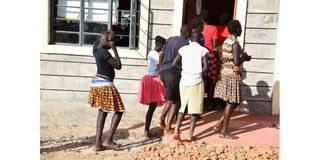Mothers-in-law, husbands take blame for FGM rise in Pokot

Girls rescued from FGM and early marriages, at Komesi Resource Centre in Kongelai, West Pokot County on December 08, 2020. The rising cases of FGM among young girls and mothers in the region have been blamed on pressure from mothers-in-law and husbands.
What you need to know:
- Rising cases of FGM in West Pokot County have been blamed on pressure from mothers-in-law and husbands.
- Women who have not undergone the cut are treated as children in their matrimonial homes.
- Elder: 'Last year, a woman's body was retrieved and reburied after she was circumcised'.
The rising cases of female genital mutilation (FGM) in West Pokot County have been blamed on pressure from mothers-in-law and husbands.
These groups are influential in determining who and when FGM is performed. They take advantage of high illiteracy level, which now stands at 67 per cent in the county, by mounting pressure on young women to undergo the cut.
In the Pokot tradition, women who have not undergone the cut are treated as children in their matrimonial homes hence, not allowed to do some things in the community.
FGM is a deeply rooted practice in West Pokot County. Its prevalence among women and girls aged 15 to 49 years now stands at 75 per cent more than the national of figure of 21 per cent according to a recent study by Unicef and World Vision.
Many newly-married women in the community are forced to undergo FGM in order to participate in certain activities.
Rampant cases
Komesi Women Network Organization chairperson Susan Krop, says mothers-in-law greatly contribute to the rampant FGM cases.
She says men are inciters while mothers-in-law harass young women to undergo the cut.
“Mothers-in-law don’t allow uncircumcised women to stay with them. They insult them saying they still green, won’t be allowed to milk, cook for people, or be the first to fetch water at the river. They are not even allowed to stand at the door. I don’t know where we are heading to,” she says.
She calls on the government to intervene and help liberate the young mothers and girls.
Ms Krop cites the elderly as the major stumbling block in ending the repugnant practice.
“Elders say people have forgotten their culture. They claim that there will be hunger and drought if girls are not circumcised,” she says.
She faults men for being silent and not telling their mothers off when they pressurise their wives to go for the cut.
Irep Foundation Director Domtillah Chesang’, says FGM remains rampant due to peer pressure and stigma.
“The practice is a violation of human rights and those perpetrating it should face the penalty. When you stigmatize a girl to undergo FGM, she will suffer pain for life,” she says.
Afford food
She warns men noted that Pokot men only marry circumcised girls citing that many challenges are brought by FGM where people can’t afford food.
“Poverty and hardship have forced them to cut their girls and marry them off to get dowry. In this community, FGM is a requisite of early child marriage,” she says.
Chesang’ tells nation.africa that girls in villages are suffering in silence and need urgent medical attention. They are hiding because they fear getting arrested.
“We need our girls alive. We must rescue them and give medical attention, and psychological support,” she says.
The activist calls on the government and authorities to take action.
A Pokot council of elder Mastait Lockles, has condemned those who retrieve dead women's bodies when they are buried without being cut.
“In August last year, we were left in shock after a woman's body was retrieved and reburied after she was circumcised,” he says.
Pokot culture
He explains that it is against the Pokot culture to retrieve the dead from the grave hence, wonders how the perpetrators get the courage to perform FGM on the dead.
“It's not in Pokot culture to cut the dead. When a person dies he or she can never be disturbed,” he says.
Cheposera Ritaa an FGM victim and reformed circumciser, says women circumcisers are ready to join the fight against the vice but observes that the culture is so deep that it sometimes draws them back.
“Despite the fact that most girls are against the practice, our people still value culture a lot. Some politicians even use it as a campaign tool,” she says.
Kacheliba Sub-county deputy county commissioner Kennedy Kiprop, says many girls are married off at a tender age before attaining full potential, hence increasing poverty level,” he says.
He calls on parents in the region to ensure girls are retained in school until they complete their education.




